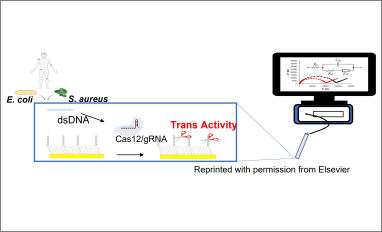 Congratulations to our Ph.D. students Andrea Bonini, Noemi Poma and Federico Vivaldi from the Chemistry Lab for Analytical Technologies and Sensors (CATS), for their recent research article entitled "A label-free impedance biosensing assay based on CRISPR/Cas12a collateral activity for bacterial DNA detection". The rapid and selective identification in the clinical setting of pathogenic bacteria causing healthcare associated infections (HAIs) and in particular blood stream infections (BSIs) is a major challenge.
Congratulations to our Ph.D. students Andrea Bonini, Noemi Poma and Federico Vivaldi from the Chemistry Lab for Analytical Technologies and Sensors (CATS), for their recent research article entitled "A label-free impedance biosensing assay based on CRISPR/Cas12a collateral activity for bacterial DNA detection". The rapid and selective identification in the clinical setting of pathogenic bacteria causing healthcare associated infections (HAIs) and in particular blood stream infections (BSIs) is a major challenge.
Traditional laboratory techniques such culture and polymerase chain reaction (PCR)-based methodologies are often associated to long turnaround times, which justify the pressing need for the development of rapid, specific and portable point of care devices. The recently discovered clustered regularly interspaced short palindromic repeat loci (CRISPR) and the new class of programmable endonuclease enzymes called CRISPR associated proteins (Cas) have revolutionised molecular diagnostics. The use of Cas proteins in optical and electrochemical biosensing devices has significantly improved the detection of nucleic acids in clinical samples. In this study, a CRISPR/Cas12a system was coupled with electrochemical impedance spectroscopy (EIS) measurements to develop a label-free biosensing assay for the detection of Escherichia coli and Staphylococcus aureus, two bacterial species commonly associated to BSI infections. Their work is available at the following link: https://doi.org/10.1016/j.jpba.2021.114268


